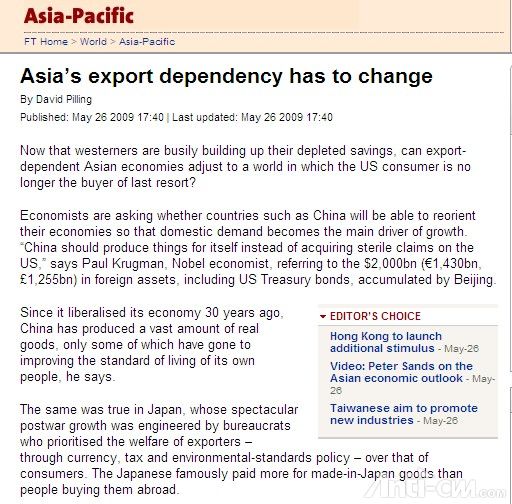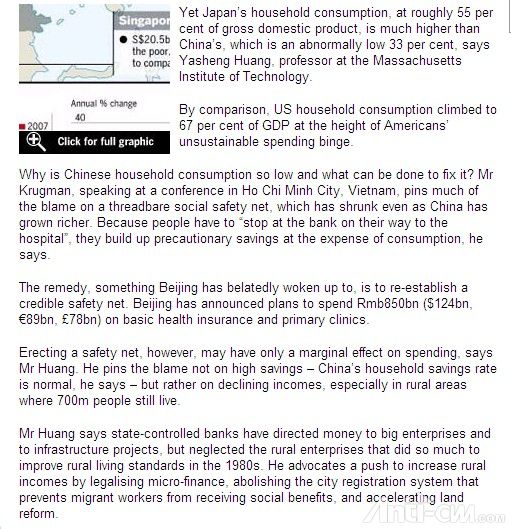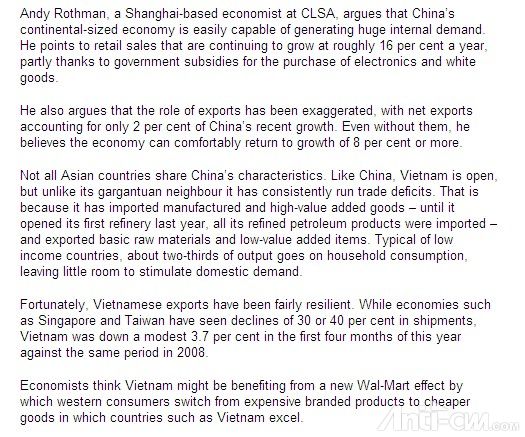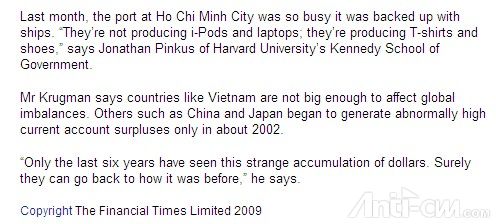|
|
Asia’s export dependency has to change
http://www.ft.com/cms/s/0/b5bf005a-4a10-11de-8e7e-00144feabdc0.html
By David Pilling Published: May 26 2009 17:40 | Last updated: May 26 2009 17:40
Now that westerners are busily building up their depleted savings, can export-dependent Asian economies adjust to a world in which the US consumer is no longer the buyer of last resort?
Economists are asking whether countries such as China will be able to reorient their economies so that domestic demand becomes the main driver of growth. “China should produce things for itself instead of acquiring sterile claims on the US,” says Paul Krugman, Nobel economist, referring to the $2,000bn (€1,430bn, £1,255bn) in foreign assets, including US Treasury bonds, accumulated by Beijing.
Since it liberalised its economy 30 years ago, China has produced a vast amount of real goods, only some of which have gone to improving the standard of living of its own people, he says.
The same was true in Japan, whose spectacular postwar growth was engineered by bureaucrats who prioritised the welfare of exporters – through currency, tax and environmental-standards policy – over that of consumers. The Japanese famously paid more for made-in-Japan goods than people buying them abroad.
Yet Japan’s household consumption, at roughly 55 per cent of gross domestic product, is much higher than China’s, which is an abnormally low 33 per cent, says Yasheng Huang, professor at the Massachusetts Institute of Technology.
By comparison, US household consumption climbed to 67 per cent of GDP at the height of Americans’ unsustainable spending binge.
Why is Chinese household consumption so low and what can be done to fix it? Mr Krugman, speaking at a conference in Ho Chi Minh City, Vietnam, pins much of the blame on a threadbare social safety net, which has shrunk even as China has grown richer. Because people have to “stop at the bank on their way to the hospital”, they build up precautionary savings at the expense of consumption, he says.
The remedy, something Beijing has belatedly woken up to, is to re-establish a credible safety net. Beijing has announced plans to spend Rmb850bn ($124bn, €89bn, £78bn) on basic health insurance and primary clinics.
Erecting a safety net, however, may have only a marginal effect on spending, says Mr Huang. He pins the blame not on high savings – China’s household savings rate is normal, he says – but rather on declining incomes, especially in rural areas where 700m people still live.
Mr Huang says state-controlled banks have directed money to big enterprises and to infrastructure projects, but neglected the rural enterprises that did so much to improve rural living standards in the 1980s. He advocates a push to increase rural incomes by legalising micro-finance, abolishing the city registration system that prevents migrant workers from receiving social benefits, and accelerating land reform.
Andy Rothman, a Shanghai-based economist at CLSA, argues that China’s continental-sized economy is easily capable of generating huge internal demand. He points to retail sales that are continuing to grow at roughly 16 per cent a year, partly thanks to government subsidies for the purchase of electronics and white goods.
He also argues that the role of exports has been exaggerated, with net exports accounting for only 2 per cent of China’s recent growth. Even without them, he believes the economy can comfortably return to growth of 8 per cent or more.
Not all Asian countries share China’s characteristics. Like China, Vietnam is open, but unlike its gargantuan neighbour it has consistently run trade deficits. That is because it has imported manufactured and high-value added goods – until it opened its first refinery last year, all its refined petroleum products were imported – and exported basic raw materials and low-value added items. Typical of low income countries, about two-thirds of output goes on household consumption, leaving little room to stimulate domestic demand.
Fortunately, Vietnamese exports have been fairly resilient. While economies such as Singapore and Taiwan have seen declines of 30 or 40 per cent in shipments, Vietnam was down a modest 3.7 per cent in the first four months of this year against the same period in 2008.
Economists think Vietnam might be benefiting from a new Wal-Mart effect by which western consumers switch from expensive branded products to cheaper goods in which countries such as Vietnam excel.
Last month, the port at Ho Chi Minh City was so busy it was backed up with ships. “They’re not producing i-Pods and laptops; they’re producing T-shirts and shoes,” says Jonathan Pinkus of Harvard University’s Kennedy School of Government.
Mr Krugman says countries like Vietnam are not big enough to affect global imbalances. Others such as China and Japan began to generate abnormally high current account surpluses only in about 2002.
“Only the last six years have seen this strange accumulation of dollars. Surely they can go back to how it was before,” he says.




|
Asia, change, dependency, export, Asia, change, dependency, export, Asia, change, dependency, export, 金融时报
|